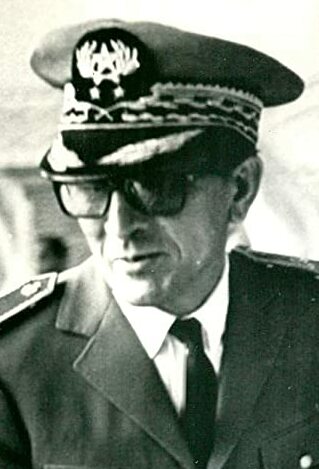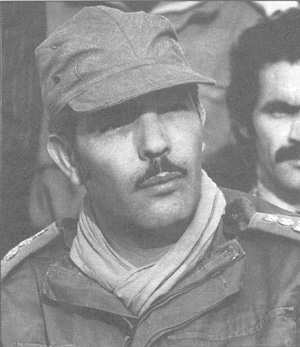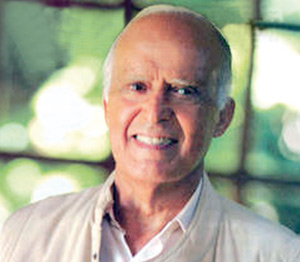
Hassan II was King of Morocco from 1961 until his death in 1999. A member of the Alawi dynasty, he was the eldest son of Sultan Mohammed V, and his second wife, Lalla Abla bint Tahar.

The Green March was a strategic mass demonstration in November 1975, coordinated by the Moroccan government and military, to force Spain to hand over the disputed, autonomous semi-metropolitan province of Spanish Sahara to Morocco. The Spanish government was preparing to abandon the territory as part of the decolonization of Africa, just as it had granted independence to Equatorial Guinea in 1968. The native inhabitants, the Sahrawi people, aspired to form an independent state. The demonstration of some 350,000 Moroccans advanced several kilometers into the Western Sahara territory. Morocco later gained control of most of the former Spanish Sahara, which it continues to hold.

Mohamed Abdelaziz was the 3rd Secretary General of the Polisario Front, from 1976, and the 1st President of the Sahrawi Arab Democratic Republic from 1982, until his death in 2016.
Tazmamart was a secret prison in the Atlas Mountains of Morocco holding political prisoners. The prison became a symbol of oppression in the political history of contemporary Morocco. It is located near the city of Er-Rich, between Errachida and Midelt. It was managed by commandant Feddoul and Hamidou Laanigri, both Royal Moroccan Gendarmerie officials.

General Si Mohamed ben Ahmed Oufkir was a Moroccan senior military officer who held many important governmental posts. It is believed that he was assassinated for his alleged role in the failed 1972 Moroccan coup attempt.

The Army of Liberation was an organization of various loosely united militias fighting for the independence of Morocco from the French-Spanish coalition.

Malika Oufkir is a Moroccan Berber writer and former victim of enforced disappearance. She is the daughter of General Mohamed Oufkir and a cousin of fellow Moroccan writer and actress Leila Shenna.

The National Union of Popular Forces was founded in 1959 in Morocco by Mehdi Ben Barka and his entourage, because they found that the Istiqlal Party was not radical enough.

Ahmed Dlimi was a Moroccan General under the rule of Hassan II. After General Mohamed Oufkir's 1972 assassination, he became Hassan II's right-hand man. He led the Western Sahara War and played a major role in Angolan Civil War. He was promoted to General during the Green March in 1975, and took charge of the Moroccan Armed Forces in the Southern Zone, where the military were fighting the Polisario Front.

Jacques Peyroles, better known by his pen name Gilles Perrault, was a French writer and journalist.
Christine Daure-Serfaty was a French human rights activist and writer who distinguished herself in Morocco where she embraced the fight of the victims of King Hassan II, during the "Years of Lead," and from afar, played a major role in the evolution of the regime and the human rights in Morocco. She was the wife of Abraham Serfaty, a Moroccan dissident. In 1974 Abraham Serfaty was sentenced to life imprisonment. It was in September 1999 that the new Moroccan king, Mohammed VI, permitted Abraham Serfaty’s return to Morocco.

The Royal Advisory Council for Saharan Affairs is an advisory committee to the Moroccan government on Western Sahara. It was created under Mohammed VI in early 2006, after a new autonomy plan proposed by Morocco to replace the United Nations' Baker Plan. The Polisario Front opposes Morocco's autonomy plan, demanding for a referendum and independence.

Ahmed Moulay Laraki was Moroccan politician and a figure of the national movement and served as the sixth Prime Minister of Morocco from October 6, 1969, to August 6, 1971, under King Hassan II. He also served as the foreign minister from 1967 to 1971.

Azzeddine Laraki was a politician who served as Prime Minister of Morocco from 30 September 1986 to 11 August 1992. He was the tenth Prime Minister of Morocco and served under king Hassan II. He was Secretary General of the Organisation of the Islamic Conference (OIC) from 1997 to 2000. He was the first Moroccan official to hold that position.

Khalihenna Ould Errachid is a Moroccan Sahrawi politician. He is the president of the Royal Advisory Council for Saharan Affairs (CORCAS), a government body behind Morocco's proposed autonomy plan for Western Sahara.
Since the end of the 1980s, several members of POLISARIO have decided to discontinue their military or political activities for the Polisario Front. Most of them returned from the Sahrawi refugee camps in Algeria to Morocco, among them a few founder members and senior officials. Some of them are now actively promoting Moroccan sovereignty over Western Sahara, which Morocco considers its Southern Provinces. Their individual reasons to stop working for POLISARIO, as reported in the media, vary, but include allegations of human rights violations, monopolization and abuse of power, blackmailing and sequestering the refugee population in Tindouf, and squandering foreign aid. They also claim POLISARIO is controlled by the government of Algeria and as one former member of POLISARIO put it, "[was] a group of Moroccan students who were urging the Spanish colonizer to leave and who had never claimed independence or the separation from motherland Morocco."
The Years of Lead was a period of the rule of King Hassan II of Morocco, from roughly the 1960s through the 1980s, marked by state violence and repression against political dissidents and democracy activists.

Abbas El Fassi is a Moroccan politician and businessman who served as the 14th Prime Minister of Morocco from 19 September 2007 to 29 November 2011. El Fassi, a member of the Istiqlal Party, replaced independent Driss Jettou.

Bouchaib Arroub is a Moroccan army general. He held the position of the Inspector General of the Moroccan army between 13 June 2014 and January 2017.
Abdellah Kadiri was a Moroccan Minister of Tourism and Colonel Major .














